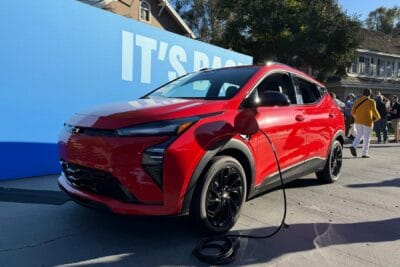Canada delays EV sales mandate amid trade pressures
The EV Availability Standard (EVAS) policy, which was introduced under Carney’s predecessor Justin Trudeau, included further targets of 60 per cent zero-emission sales by 2030 and 100 per cent by 2035. Now, the mandate has been delayed by one year while the government policy review seeks ways to make it more ‘affordable’.
This delay is not seemingly related to Canada’s inability to meet its targets; in 2024, EV sales made up as much as 18 per cent of the overall car sales market in Canada, suggesting decent progress towards the target. Admittedly, this figure fell by more than half when the government’s $5000 EV rebate was indefinitely ‘paused’ in January of this year. But Canada’s government says the delay has less to do with the state of the EV market than it does with strict new US tariffs putting undue pressure on the auto industry: 50 per cent on steel and aluminium, 25 per cent on auto parts and vehicles, plus broader economic strains.
According to Automotive News Canada, the mandate delay then follows “months of lobbying from the auto industry” amid this challenging economic backdrop – including the Canadian Vehicle Manufacturers’ Association, which counts Ford, GM, Stellantis and others among its members. Prime Minister Carney thus justified the policy change by saying: “We have an auto sector that because of the massive change in US trade policy is under extreme pressure. We recognise that. The EV mandate adds to the liquidity issues they have, the financial challenges these producers have. They’ve got enough on their plate right now so we are taking that off.”
The move has been welcomed by industry, with Brian Kingston of the Canadian Vehicle Manufacturers’ Association calling it an “important first step”. In a statement shared by CBC, he said: “A full repeal of the regulation if the most effective way to provide immediate relief to the industry and keep it competitive.”
Meanwhile, David Adams, the president of Global Automakers Canada, said his organisation is “pleased that the federal government has recognised that consumer adoption of electric vehicles is not where either government nor industry had anticipated it would be a few short years ago. Our members are fully committed to the transition of their product portfolios to electrified transportation and this is the future of our sector, however that transition can only happen as quickly as consumers are willing to move.”
However, the decision has been met with criticism by Carney’s political opponents. Conservative Leader Pierre Poilievre called it a “clumsy retreat”, saying: “Now, businesses who would otherwise consider investment in automaking here in Canada will have to put that investment on hold while Mark Carney dithers for another year.”
It remains to be seen what the conclusion of the government’s review into the sales mandate will be. Long-term zero-emission targets remain officially intact, but this delay reflects uncertainty and fragility. It could lead to adjustments to the original mandate or the introduction of alternative incentives, but this won’t become clear until later.
It’s also not obvious whether Canada would have met the targets under the existing rules anyway. In June, Canada’s parliamentary budget office produced updated estimates around how the relative ownership costs of ZEVs and ICEs must change for Canada to reach its sales targets. In the absence of the zero-emission vehicle rebate programme, it estimated that the relative ownership cost of BEVs would have to decrease by 33 per cent if Canada was to meet its ZEV sales target of 60 per cent by 2030. That’s an enormous reduction at a time when auto companies are already struggling with liquidity.
pbo-dpb.ca, electricautonomy.ca, cbc.ca, pm.gc.ca, driving.ca





0 Comments